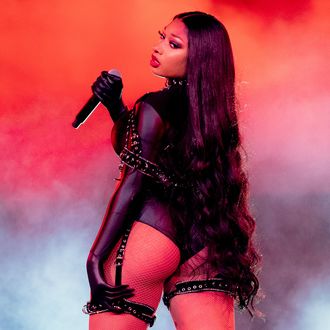
Megan Thee Stallion penned a powerful op-ed defending Black women in the New York Times Tuesday. If her music wasn’t already a manifesto for all the reasons society needs to protect Black women, she spells it out in 1,000 words, addressing the upcoming presidential election, sexism, police brutality, and violence against women. “In the weeks leading up to the election, Black women are expected once again to deliver victory for Democratic candidates,” the 25-year-old opens. “We have gone from being unable to vote legally to a highly courted voting bloc — all in little more than a century. Despite this and despite the way so many have embraced messages about racial justice this year, Black women are still constantly disrespected and disregarded in so many areas of life.”
She touches on the violence committed against her, a shooting which rapper Tory Lanez was charged for last week, and her emotional Saturday Night Live debut, where she called out Kentucky attorney general Daniel Cameron, but rebukes the backlash she faced for speaking up. After she came forward about being shot in the feet this summer, Tory Lanez’s supporters tirelessly mocked and denied her pain, and then Lanez dropped an album defending himself. “I’m not afraid of criticism,” she continues. “We live in a country where we have the freedom to criticize elected officials. And it’s ridiculous that some people think the simple phrase ‘Protect Black women’ is controversial. We deserve to be protected as human beings.” That includes protecting Black mothers, whose mortality rates are “about three times higher than those for white mothers, an obvious sign of racial bias in health care,” she writes. And it means allowing Black women and girls to do whatever they want and wear whatever they want without being “inundated with negative, sexist comments.”
Megan Thee Stallion says she envisions a world where, instead, girls are taught “the many important things we’ve achieved,” like legendary NASA mathematician Katherine Johnson or the Little Rock Nine, Black girls who led the path to school integration in 1967. “But that will take time, and Black women are not naïve. We know that after the last ballot is cast and the vote is tallied, we are likely to go back to fighting for ourselves. Because at least for now, that’s all we have.” What are you going to do to make her dream a reality?

